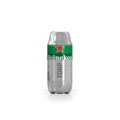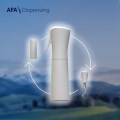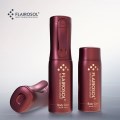

In an era in which sustainability must drive product innovation, Manouk Verschure, Product Designer, and Marnix The, Product Development Manager, exemplify AFA’s commitment to creating the next generation of eco-conscious spray solutions. In a recent conversation with them, we discussed the relationship between product design and sustainability, preparing for new legislation, and our partnership with RecyClass, a non-profit pushing for circularity in plastic.
RecyClass is a non-profit, cross-industry initiative working to accelerate the transition toward circular plastics consumption, ensuring the highest quality plastic materials possible for reuse. Their tagline, “The future of plastic is circular!”, underlines this mission. ‘Across AFA’s portfolio, we’ve received several recycling-compatible RecyClass certifications, including our Opus combined with PET, PP, and HDPE bottles’, Marnix explains. ‘As our liquid dispensing solutions are not end-products, they can only receive a ‘letter of compatibility’ with current sorting and recycling technology. Our customers would need to request a RecyClass audit with their liquid solution inside, as well as any labels the end product would contain. For example, a viscous fluid that leaves residue might receive a lower score. It’s also important to note that the certificates only apply to a specific configuration.’
Manouk adds, ‘Working in product design, and with RecyClass, allows us to explore new ideas for eco-friendly liquid dispensing. Looking ahead, we aim to lead the way towards a more sustainable future. That’s what AFA is about: re-inventing liquid dispensing systems.’
Partnering with Recyclass
‘With the upcoming Packaging and Packaging Waste Regulation (PPWR) directive, governments across Europe - regardless of political shifts - are focusing on achieving the wider green goals of the European Union (EU). In this context, we expect to see new laws on plastic waste very soon. So getting prepared now is essential. RecyClass is in close contact with government agencies in Europe, and we expect that upcoming EU plastic regulations, such as PPWR, will be aligned with their labeling system,' says Marnix. ‘While we don’t know exactly how the PPWR legislation will be interpreted, by getting prepared for it now and working with RecyClass, we should be ready for it when it becomes law,’ Manouk notes. ‘At the same time, it’s a springboard toward improving our products, making our portfolio sustainable for the future.’ Marnix adds: ‘RecyClass’ impact reaches beyond Europe too: the Association of Plastic Recyclers (APR) in the United States also works with RecyClass.’
From lifecycle to design and transport
Recyclability has always been a topic at AFA Dispensing,’ Marnix continues. ‘I’ve been working on it for many years. When I first heard about RecyClass, I was immediately interested.’
‘It’s not just about products’ end-of-life. Recyclass are also promoting design for recycling, as well as establishing a unified approach toward recycled plastic calculation & traceability in Europe.' Manouk adds, 'The EU’s PPWR legislation is all about getting Europe together', including the plastic-use industry, plastic product manufacturers, and end-product manufacturers whose products end up in the waste stream, to get us all on the best track forward.'
How does RecyClass work?
RecyClass classifies plastic products’ recyclability through an extensive eight-step process before issuing a class score certificate. 'The certifications are from A to F,' explains Marnix, 'with products scoring A to C considered recyclable. They look at every aspect of the product. This includes the presence of any ‘instant disqualifiers’, like metal springs or non-recyclable materials, the plastic’s sortability in the waste stream, the percentage of recycled content it contains, and much more.' For more details, see the RecyClass test method below:
‘With a system like this, RecyClass stimulates the industry,’ Manouk tells us. ‘Every link in the chain, from plastic converters like us to consumer-facing product manufacturers, wants to get the highest RecyClass score possible, so the ball keeps rolling.’
The full story
‘There’s so much happening with plastics at the moment,’ Marnix shares. ‘It’s a huge industry with many developments and challenges. Plastic is all around us; we hear many negative messages about it, but they are not the full story. As a society, we benefit greatly from plastic’s durability, versatility, and efficiency.’
He continues: ‘Even though sustainability is so important today, the message isn’t always getting across. With a system like this, linked to the upcoming PPWR legislation, the push will be heavier. One scenario could be having to pay a higher tax rate if your recycling score is lower. And it doesn’t end there: imagine if, in the future, you won’t be allowed to sell ‘Class E’ products on EU markets; we’ll see an even bigger impact.’
Looking forward in a ‘field of tension’
‘At AFA, we want to continue to enhance our products’ sustainability performance, meeting customer and consumer demands, while navigating changing legislation. The transition is not without risks, but we’re committed to staying open and transparent with consumers and customers about the materials we use, their origins, and their disposal.’
‘Almost every industry has sustainability on its agenda, and liquid dispensing is no different,’ says Marnix. Companies are eager to meet growing sustainability demands from achieving lower CO2 emissions to reducing plastic waste. At the same time, we’re seeing the EU focus on achieving its wider green goals. In this context, we expect to see new laws on plastic waste very soon. So getting prepared now is essential.’














































